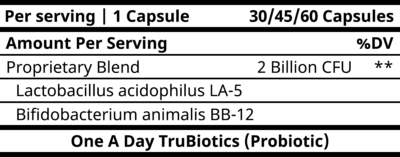| Marketing | Ingredients | Additives | Reviews | Pricing | Overall |
According to the One A Day TruBiotics Probiotic reviews, this has helped quite a lot of people. Some praise it for curing their constipation problem. Others simply are extremely happy with this supplement working well for them. Others more adore the fact that the capsule is a really small one, hence very easy to swallow. Others yet simply note that it’s the best one. So, throughout this TruBiotics Probiotic review, we’ll really look at that and research everything.
The plan is to establish a baseline of the supplement with a look at its promotional materials. And then, to analyze it by going through various aspects. We’ll be covering beneficial ingredients, additives, success rates, and pricing.
Marketing | Very Minimalistic In Their Approach
According to the manufacturer, the One A Day TruBiotics “works two ways – with the two most clinically studied types of good bacteria to help both your digestive and immune systems work at their best.” So, promising, to say the least [R].
 The product page is as minimalistic as they come. It reminds me of those by supplements like the Healthy Origins Probiotic (review) and Pearls Acidophilus (review).
The product page is as minimalistic as they come. It reminds me of those by supplements like the Healthy Origins Probiotic (review) and Pearls Acidophilus (review).
It also doesn’t use any marketing tactics whatsoever. Which is a rather rare thing to see.
As for the benefits, One A Day TruBiotics Probiotic promises to promote digestive health, healthy metabolism, and immune system health, as well as to foster overall health and wellness since gut health translates into many other things, too.
As far as the free-of claims, they really bring any other than Gluten-Free, Soy-Free, and Animal-Gelatin-Free (that last one I haven’t really seen before ever). Hence, this essentially means that the supplement is not Non-GMO, Milk-Free, Lactose-Free, and probably others, too.
Overall, superficially, it seems like a decent thing. Plus, I love the fact that they guarantee the listed potency at the expiration date. Which, indeed, is different than how many other manufacturers approach this aspect.
Ingredients | I Like The Probiotic Strains & I Don’t Like The Lack
There are all kinds of approaches various Probiotic supplements take. For example, we have those that bank on thorough diversity like the Gives Health Wholesome Probiotics (review) or Dr. Mercola Complete Probiotics (review). Whereas others are more specialized or just narrower in their approach like the Florajen Acidophilus (review) or GoodBelly Probiotics (review). The supplement of this review is more like the latter.
 So, per serving (one capsule), the TruBiotics Probiotic supplement offers 2 Billion CFU of a Proprietary Blend. This is a blend that is made out of two patented Probiotic strains – Lactobacillus acidophilus LA-5 and Bifidobacterium animalis BB-12.
So, per serving (one capsule), the TruBiotics Probiotic supplement offers 2 Billion CFU of a Proprietary Blend. This is a blend that is made out of two patented Probiotic strains – Lactobacillus acidophilus LA-5 and Bifidobacterium animalis BB-12.
So, what is that?
Well, right off the bat, 2 Billion CFU is such a low amount. With Probiotics just in general, this is an amount that won’t contribute to any meaningful gains. What we should be pursuing instead is at least 20-40 Billion CFU. That’s the amount according to the best practices. Namely, 2 Billion CFU is kind of 10-fold short. Hence, I don’t think the benefits will properly chime in [R, R, R, R, R, R, R, R, R, R, R, R, R, R, R, R].
I mean, I like Lactobacillus acidophilus. It is a lactic-acid-producing Probiotic strain naturally found in human intestines, mouth, and vagina. It turns carbohydrates into lactic acid. And it can be plenty of helpful as it can reduce and prevent both eczema and diarrhea, improve cholesterol levels, help with weight loss, help fight off IBS and allergies, and produce both lactase, as well as vitamin A and K, and provide other benefits [R, R, R, R, R, R, R].
I also agree with having Bifidobacterium animalis. It’s a Probiotic that naturally populates the colon of most mammals, also humans. It’s a Probiotic that grows well in milk and can deliver gains like improved digestion and immune health, promote healthy cholesterol levels, fight against all kinds of bowel problems, heal eczema, battle lactose intolerance, as well as help with urinary tract infections, and other things [R, R, R, R, R, R, R, R, R].
Both are just way too scarce for a meaningful gain, the way I see it. I mean, there are quite a few studies in which these have been researched. Still, most of them used far higher amounts than about 1 Billion CFU each. And I don’t really get why TruBiotics doesn’t take the effort to be more abundant. To that end, the supplement all in all just feels like a lazy way of doing it [R, R, R, R, R, R, R, R, R].
And that’s never a good feel.
Also, going with just two strains is not the most optimal way if general health and wellbeing are our concern. I would much rather propose at least 10 different strains [R, R, R, R].
Another very desirable thing with any Probiotic supplement is that they add Prebiotics. The TruBiotics Probiotic doesn’t really do that. Thus, we’re missing out on a whole bunch of different improvements to gut health and just the potential of the good bacteria in general [R, R, R, R, R, R, R, R, R, R, R, R, R, R].
Another thing I love to see is third-party testing. The supplement of this review doesn’t have that. Furthermore, I’m not really sure what kind of quality it subscribes to. I mean, the fact that they carefully monitor quantity is an element of quality but still. Not having a dedicated section on the website for that doesn’t really convince.
Additives | I Think Additives Are Some Of The Worst I’ve Seen In A While
Additives are the other ingredients added for the making of the supplement. The importance of looking at them lies in the fact that not every ingredient approved for consumption by the various authorities is actually good for us. For example, having Sucralose as in TheraBreath Probiotics (review) has never been a healthy thing [R, R, R, R, R, R, R, R, R, R, R, R].
And that’s not the only example. There are many, many out there. And sadly, the TruBiotics One A Day Probiotic is not really free of that either.
So, the supplement of this review uses Anhydrous Sugar, Skim Milk Powder, Hydroxypropyl Methylcellulose, Inositol, Magnesium Stearate, Sodium Ascorbate, Sodium Glutamate, Titanium Dioxide (color), and Yeast Extract.
 Of these, I’m fine with Skim Milk Powder, Hydroxypropyl Methylcellulose, Inositol, Magnesium Stearate, and Sodium Ascorbate. The Yeast Extract is probably fine as well. But Anhydrous Sugar, Sodium Glutamate, and Titanium Dioxide are definitely not okay. Here’s why.
Of these, I’m fine with Skim Milk Powder, Hydroxypropyl Methylcellulose, Inositol, Magnesium Stearate, and Sodium Ascorbate. The Yeast Extract is probably fine as well. But Anhydrous Sugar, Sodium Glutamate, and Titanium Dioxide are definitely not okay. Here’s why.
Anhydrous Sugar is just sugar. And that’s something by far most people already have too much in their diets. Furthermore, overconsumption can cause diabetes, obesity, depression, heart disease, learning difficulties and stupidity, cancer, eating disorders, and bring utter havoc to our digestive health. Hence, we prefer to avoid it in supplements as well [R, R, R, R, R, R, R, R, R, R].
Titanium Dioxide is something that used to be harmless. I mean, it’s an element naturally found in nature, and that one is completely harmless. But in supplements and food, we typically have the nano version of that. And that’s been proven to be too small for our bodies to filter, hence it can cause all kinds of damage starting from lung to liver to brain damage. Not an optimal thing to consume [R, R, R, R, R, R, R, R].
Whereas Sodium Glutamate is just stupid to have in a supplement. It also goes by the name of Monosodium Glutamate. And it’s a flavor enhancer. And as a flavor enhancer is an absolute cancer. It can bring brain damage, obesity, hepatic damage, reproductive problems, disruptions in adipose tissue physiology, CNS disorders (like autism, brain tumors, addiction, and others) chest pain, nausea, fatigue, headaches, burning sensation, tingling sensation, irritable bowel syndrome, numbness, heart palpitations, and a plethora of others [R, R, R, R, R, R].
It also messes with leptin production which basically just means that our bodies forget to tell us that we’re full, and we need not eat anymore [R, R, R].
Another aspect Probiotic supplements have to think about is whether or not the strains survive the stomach acid. Because many don’t [R, R, R].
So, the strains in TruBiotics definitely can survive the stomach acid. But some will still likely die off due to it (for example, the Bifidobacterium animalis BB-12’s survival rate is about 80% or above). And hence, no matter how we look at it, going with a proper delayed-release capsule is always better [R, R, R, R].
Reviews | Customer Reviews Carry A Good Vibe For TruBiotics Probiotic
Due to how minimalistic the manufacturer’s page is, it doesn’t really offer any insight as to what the customer feedback is like. Hence, to find some One A Day TruBiotics reviews, I researched all the third-party sites I could find. To that end, I think I found a decent amount of ratings.
I mean, it’s certainly considerably more abundantly reviewed than something like the Biotrust PRO-X10 Probiotic (review) or the Nature Made Acidophilus Probiotics (review).
 In total, I managed to find 1,085 One A Day TruBiotics Probiotic reviews. Of these, 990 were positive (62 three-star, 151 four-star, 777 five-star) and 95 were negative (71 one-star, 24 two-star). Hence, as far as the success rate goes, it’s sitting at 91.2%.
In total, I managed to find 1,085 One A Day TruBiotics Probiotic reviews. Of these, 990 were positive (62 three-star, 151 four-star, 777 five-star) and 95 were negative (71 one-star, 24 two-star). Hence, as far as the success rate goes, it’s sitting at 91.2%.
And that’s quite high, especially considering the non-optimal beneficial ingredient amounts and the nasty additives.
And there’s the danger. Customer reviews are never everything. Which is why we should never just look at the customer feedback and base our decisions on that. I mean, we can really get it wrong with that kind of approach as I believe there are so many supplements that have success rates above what they would deserve. Plenty of examples I could point to.
And I think the TruBiotics is kind of the same way.
Still, let us actually look at what the customers are saying. I mean, for sure, there are many people that absolutely swear by it. But what about the not-so-positive comments?
Well, for some, it was just the simple matter of receiving an expired product. Which is odd. Then, many others complained about it not doing anything at all. But then, quite a few noted that it actually made things considerably worse for them. Others were unhappy with the product box being opened when it arrived. And others more noted that it’s too expensive.
Pricing | The Supplement Is Overpriced As Hell, That’s Putting It Lightly
So, we’ve got at least one person saying that this is way too expensive as a supplement. But what’s the reality of that? Does that statement represent it accurately? Or is it just a matter of emotional disappointment and something that can’t really be grounded in numbers? Let’s look at that.
So, per container (30 capsules), the supplement of this review typically costs $17.11. To do the math, that’s $0.57 for every capsule or serving. Or, to put it in more comparable terms, it costs $2.85 for every 10 Billion CFU.
 And that’s some very steep price.
And that’s some very steep price.
I mean, compare it to something like the Phillips’ Colon Health (review). It costs typically $12.95 per container of 30 servings. Which is $0.43 per capsule or 28.8 cents for every 10 Billion CFU.
It likely offers similar quality (no third-party testing) but in terms of additives, it’s like comparing day and night. Phillips’ Probiotic doesn’t use any bad ingredients in that regard. It’s Non-GMO. Furthermore, it offers one extra strain. And, yeah, the price difference is effectively 7-fold in favor of Colon Health.
To put it lightly, I think One A Day TruBiotics is absolute rubbish when compared to Phillips’.
I mean, even when we compare it to something really expensive like the Bowtrol Probiotics (review), it’s still not good for the One A Day Probiotic.
Bowtrol costs $1.33 for every 10 Billion CFU but for that, it offers genuine quality. It’s got great additives, four Probiotic strains with very capable total amounts per capsule. And it’s third-party tested as well.
Frankly, it takes no expert to reassure. The One A Day TruBiotics Probiotic is incredibly pricey. And I would say that it’s also low value.
Overall | To Sum It Up, There’s Not A Doubt In My Head – Avoid
I think I’ve hinted at that numerous times throughout the article. I don’t think that the TruBiotics of One A Day is a great supplement. It’s not even a good supplement or a poor one. I think that all in all, it is far, far, far below that.
 I mean, for positives, I think, realistically, we only have the notion of success rate. But as mentioned, we should not base our decision only on those. Oh, yes, and the fact that it uses two patented ingredients for its beneficial aspects is good, too.
I mean, for positives, I think, realistically, we only have the notion of success rate. But as mentioned, we should not base our decision only on those. Oh, yes, and the fact that it uses two patented ingredients for its beneficial aspects is good, too.
But everything else is pretty rubbish. I mean, the total CFU amounts per serving are lacking. In terms of the additives, there are a number of red flags. I wouldn’t recommend consuming those substances with supplements ever. And then, the price tag kind of seals the deal (way too expensive).
Hence, (out of avoid it, consider it, shortlist it, buy it) I would strongly recommend avoiding this. I believe the value is just too low. And overall, it can probably cause more harm than good.
On that note, if you’re interested in something of real quality when it comes to Probiotics, this is arguably one of my most favorite ones (full review).
Above all, I hope this One A Day TruBiotics Probiotic review helped you find the information you were looking for. Let me know your thoughts below. And do feel free to leave your own personal reviews on the product as well.
Hi, Matiss,
I came to know about probiotics and their properties a couple of years ago. When I started traveling, I would get sick now and then when I ate something I wasn’t used to eating. After some research, I ran across this concept of probiotics. I must confess I don’t take them all the time. I start taking them at least a week before an upcoming trip, and they do wonders!
I will bookmark your article for future reference as it is always a good idea to have more options to choose from. But the One A Day TruBiotics itself is something I probably won’t go for.
Thanks for sharing.
Hey, Enrique!
I appreciate you sharing that. To that end, I think it’s fair to say that they serve you well as a supplement category, generally. :)
And, yes, indeed. This is something to, at least in my opinion, better not go for. There are truly plenty of better options, even if you prefer to have only one or two Probiotic strains within the supplement.
Cheers,
Matiss
Thank you for this review. It covers all the bases. I would never consider taking a probiotic with only one or two strains of bacteria. I have taken probiotics I considered wonderful with 10 or more strains and 30 or more Billion CFU.
I believe everybody should take probiotics and prebiotics all the time, except when on antibiotics. The antibiotics will simply kill the pro and prebiotics, so you are throwing money down the drain to take them both simultaneously. However, as soon as you finish the antibiotics, get back on the probiotics immediately. Most people would be surprised at how much of our health starts in the intestinal tract.
I like the framework you set up for judging a probiotic. I also liked the research you referenced with the (R). It is a clever way to include research without actually having to spend time and effort to write a traditional bibliography reference or twenty or thirty of them. :)
I found the additives to this product alarming. Most of their customers probably don’t have a clue how harmful these could be for their health. It sounds like the company is putting money before the wellbeing of their customers.
I noticed you mentioned to MIchel that you would add your current recommendation to the review but I couldn’t find it. Would you mind sharing in a reply?
Hey, Lilly!
Yeah, I think that’s the best approach. Just two strains aren’t really optimal. And 100% agree about using Prebiotics and Probiotics regularly.
Absolutely, the additives are not without a doubt alarming. And, indeed, most customers probably have no idea. Which is sad. But that’s just the reality of things.
Yes, yes, of course, I somehow didn’t manage to get around to that yet. But it’s this one. But there are certainly other amazing ones out there as well. I also added the recommendation to the article.
And last of all, I wholeheartedly appreciate the kind words, Lilly! They mean a lot!
Cheers,
Matiss
Wow, I am so glad I found your site. I have never come across a review for a supplement that is so well-researched. You are extremely knowledgeable on the subject, which makes me feel very comfortable trusting you. Also, thank you for including references to the research that supports your very valid positions.
It is crazy to me that there is so few CFU in the product. I feel like there should be regulation among these products, or at least some sort of certification saying they are up to quality stands, especially as far as the number of active ingredients included in the supplement itself.
The additives make me very nervous as well. I am not sure if anhydrous sugar is as bad as regular sugars, but I do know I am trying to avoid sugar in my diet so it is troubling to see an ingredient like this in a supplement,
Lastly, I don’t put much stock in the 91% positive review feedback from customers as it is too hard for a customer to really measure the positive effects of a supplement on their body without getting a blood test or some other type of invasive doctor provided test. Probiotics help over time, so I would think you would need a doctor to really explain whether the effects are promising or whether there even is an effect on the person…also whether the effect is actually brought upon by the supplement they are taking.
I have bookmarked your site and thank you again.
Hey, Ashley!
Wow, I’m really grateful for that. I appreciate the kind words wholeheartedly. They really mean a lot. <3 <3 <3
Yeah, I think there is nothing to not be nervous about with the additives in the One A Day TruBiotics Probiotic. They are a crazy bunch. Also, I fully agree with your stand when it comes to customer reviews. That rating is questionable at best. I'm glad you don't put much stock in that customer feedback. I think that's the best way how to go about it.
Cheers, Ashley!
Matiss
There are many probiotic supplements. Most of them basic explain why you should take them and the benefits of this probiotic. Every probiotic supplement works differently, it depends on the person’s body or immune system. My physician gave me a probiotic supplement a few months back, I didn’t feel any different, still suffer bloating, using the bathroom once a day, no weight loss, it wasn’t any better than the over counter probiotic at a grocery store. So I suggest choosing one and hoping for the best.
Hey, Miracle!
That’s an interesting thought. But I don’t think that’s entirely true.
I mean, Probiotic supplements vary greatly in their potency. I mean, picking a random supplement would quite possibly mean picking one that offers 1-2 Billion CFU daily and hoping that it works well and fixes everything. But based on the potency alone, that’s kind of already something guaranteed a failure.
I mean, I would certainly not put a supplement that offers 2 Billion CFU in the same basket as one of 53 Billion CFU. The difference (and hence, likely outcome) is just nothing alike at all. But to take it a step further, yes, I think even ones with 53 Billion CFU can sometimes not work for some people. Then, it’s, indeed, the case of just picking the next best thing and trying that one out.
But ultimately, I think that’s true for every supplement.
Cheers,
Matiss
Market is full of different products and for each product sellers would say that it is “the best” on the market. My kids and I usually buy probiotics or use them when we have to take antibiotics for some reason. I am never sure if probiotics are made for protecting our immune system when it’s down, whether should be taken just to maintenance our intestinal flora, but what about people who suffer from gluten allergy?
Hey, Julijana!
Yeah, a ton of manufacturers claim that their product is the best when, in reality, it’s typically not even close.
Probiotics can both help the immune system and the maintenance of healthy intestinal flora. But helping with Gluten allergy is a bit out of reach. I mean, they can definitely be a contributing factor to making the condition better but on their own, I’m sure they don’t have the capacity to fix it.
Cheers,
Matiss
There are so many probiotics in the marketplace at the moment, it is difficult to choose which is best. Does everyone need to take a probiotic, or only if you suffer from any gut ailments?
Guaranteeing the listed potency at the expiration date is certainly a plus point for Trubiotics, but it is a pity that there are additives even in this probiotic. I see it has more cons than pros, so which probiotic would you say is a good one to start on?
Hey, Michel!
Yeah, I agree, indeed, there are so many different ones on the market.
As far as everyone or just those with gut ailments, I think it really depends. Typically I would say that anyone can benefit hugely. I mean, there are all kinds of toxins and just poor ingredients that take their toll on our gut health. And hence, Probiotics can help a lot with that. But when encountering a gut-related ailment, Probiotics can almost always help in one way or another.
As far as really great Probiotics, there are many very capable ones from what I have found. I will add my most current recommendation to the article. :)
Cheers,
Matiss